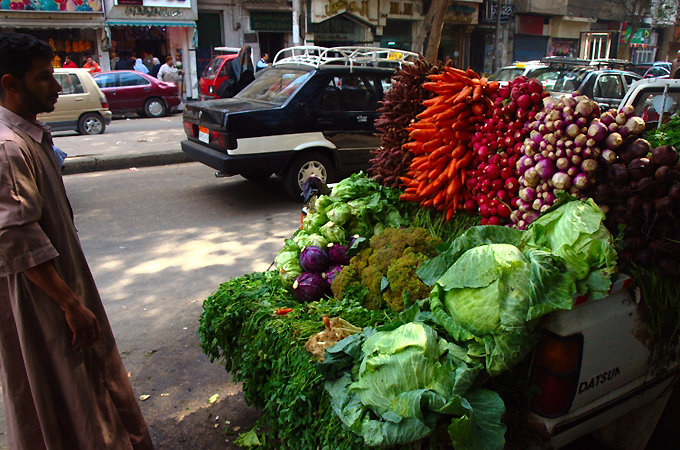Egypt businesses hit by instability
Food shortages reported and businesses remain shuttered as 16-hour curfew and protests continue.

 |
| The government’s curfew has made shipments of food into Cairo difficult, leading to rising food prices |
Cairo, Egypt – Egypt’s week-long political protests have already had serious macroeconomic implications for the country: Banks are closed, stock markets are suspended, and hundreds of millions of dollars in foreign currency has already left the country.
But the political crisis is also starting to take its toll on ordinary Egyptians.
At the open-air fruit and vegetable market in Cairo’s central al-Manial district, the price of a kilogramme of potatoes has risen to four Egyptian pounds (US $0.70), up from three pounds a week ago. Onions are up to five pounds per kilogramme at some shops, a nearly 50 per cent increase.
“It changes every day, it’s unpredictable,” said Hassan al-Masri, a vendor in the market.
“Sometimes the trucks can get through to make deliveries, sometimes they can’t.”
Hassan said many of his vendors normally bring goods into the city early in the morning, when traffic is lightest and the municipality loosens its restrictions on trucks. But the government’s 16-hour-a-day curfew has made those overnight shipments impossible.
“I have to bring in my vegetables during the day,” said Saber Hamadi, a vendor selling carrots and onions from the back of a pickup truck on al-Manial’s main commercial street.
“I lose business in the morning, and then I have to leave early to go home before the curfew, so I lose customers in the afternoon as well.”
Vendors like Hassan and Hamadi are doing better than many other businesses, though: Internet access remains unavailable across the country, and so thousands of small businesses have been unable to open.
Businesses shuttered
On some normally-busy streets in neighbourhoods far from the protests – places like El-Manial, Imbaba and Giza – more than half of the businesses are shuttered.
All of the country’s ubiquitous mobile phone stores and internet cafes are closed. Almost all livelihoods have been affected.
Several taxi drivers said they’ve had fewer fares than normal – and that, when they do have customers, the frequent roadblocks and detours cut into their profits. Ahmed Said, a taxi driver polishing his car on a back road near the Giza zoo, said he had one fare during three hours of driving that morning.
“At least my taxi is clean,” he said, making light of the situation.
And Khaled Sayed, the owner of 20 boats that do trips along the Nile, says his business is completely shut down. Sayed still has to pay his employees – though their salary has been reduced from 150 pounds per day (US $25) to just 50 pounds.
“Three-quarters of the people I know aren’t working right now,” Sayed said.
The tourism industry, the lifeblood of Egypt’s economy, has also clearly taken a hit, though no hard data is available. Many of the expensive restaurants catering to tourists – including all of the restaurant boats on the Nile – are closed; most travel agencies downtown are shuttered. (The influx of journalists, at least, has spared some of Egypt’s biggest hotels the same fate.)
Most Egyptians seemed to be taking the hardship in stride: during dozens of interviews in several Cairo neighbourhoods today, not one person called for demonstrators to end their rallies. But the economy is nonetheless a lingering uncertainty for many.
“I can’t afford to feed my family if this continues for long,” said Umm Mustafa, a housewife rushing to buy groceries in al-Manial before curfew set in.
Al Jazeera’s Evan Hill contributed to this report.